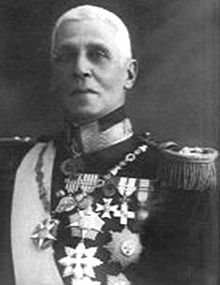Domingos da Costa Oliveira
Domingos Augusto Alves da Costa Oliveira [ duˈmĩɡuʃ dɐ ˈkɔʃtɐ oliˈvɐi̯ɾɐ ] (born July 31, 1873 in Lisbon , † December 24, 1957 ibid) was a Portuguese general, politician and prime minister .
Military career and promotion to general
After attending school, he graduated from the cadet school and then became an officer in the cavalry . In the following years he served in various cavalry regiments. In 1910 he was appointed commander of the 2nd lance regiment. In 1925 he was a graduate of the General Staff Academy. On May 28, 1926, he became the commander of the Alentejo Cavalry Brigade . Then he was commander of the 3rd military region in Tomar . On May 5, 1928, he was promoted to general and military governor of Lisbon .
Prime Minister 1930 to 1932
During the military dictatorship he became Prime Minister on January 21, 1930 as Chairman of the Ministry (Presidente do Ministério). In this functionary he was a conservative who rejected any effort to restore democracy and also condemned the military revolts in April and May 1931 in Madeira and the Azores . The political role and the growing popularity of his finance minister António de Oliveira Salazar meant that he resigned on June 25, 1932 in favor of Salazar, paving the way for his thirty-six year rule over Portugal as the New State (Estado Novo) .
Offices in the Estado Novo
He then returned to his post as military governor of Lisbon. In 1937 he became ambassador to Great Britain . A year later he was retired from active military service and became General of the Reserve . In 1942 he became president of the Supreme Military Court. In 1952 he was finally Chancellor of 1808 by the then Prince Regent and later King Johann VI. donated order of the tower and the sword. He was a member of the State Council until 1949.
The passionate rider wrote the book "Raças Cavalares Portuguesas" .
Web links
| predecessor | Office | successor |
|---|---|---|
| Artur Ivens Ferraz |
Prime Minister of Portugal 1930–1932 |
Antonio de Oliveira Salazar |
| personal data | |
|---|---|
| SURNAME | Oliveira, Domingos da Costa |
| ALTERNATIVE NAMES | Oliveira, Domingos Augusto Alves da Costa (full name) |
| BRIEF DESCRIPTION | Portuguese general, politician and Prime Minister |
| DATE OF BIRTH | July 31, 1873 |
| PLACE OF BIRTH | Lisbon |
| DATE OF DEATH | December 24, 1957 |
| Place of death | Lisbon |
